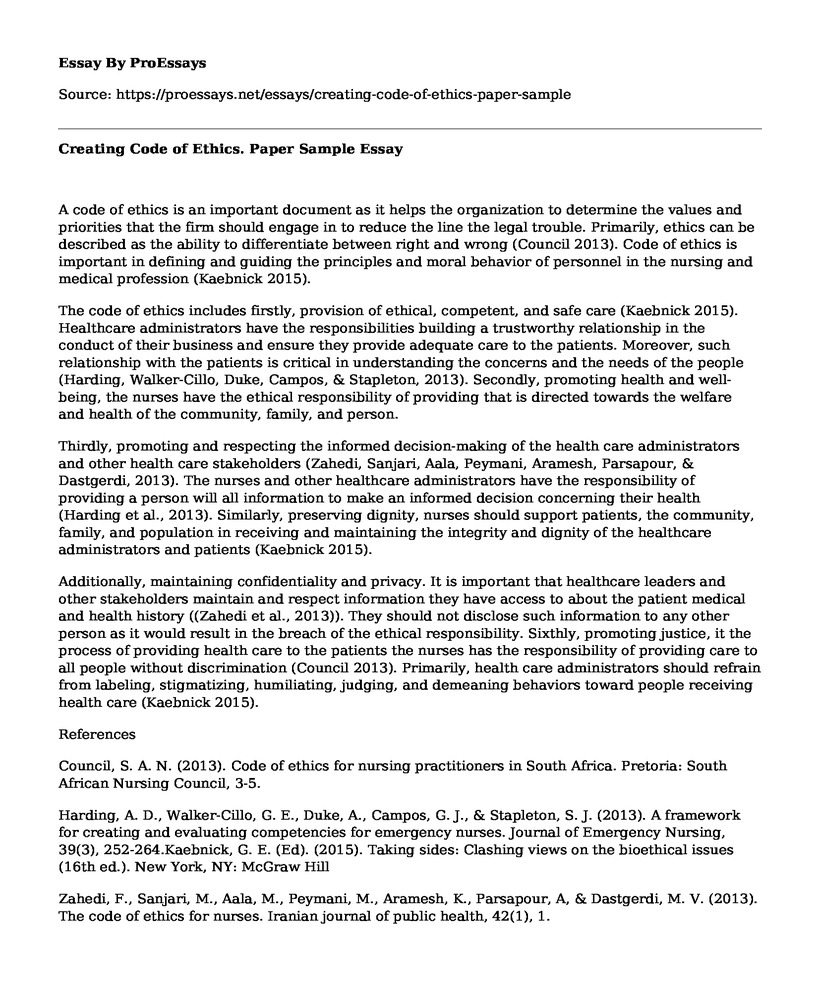A code of ethics is an important document as it helps the organization to determine the values and priorities that the firm should engage in to reduce the line the legal trouble. Primarily, ethics can be described as the ability to differentiate between right and wrong (Council 2013). Code of ethics is important in defining and guiding the principles and moral behavior of personnel in the nursing and medical profession (Kaebnick 2015).
The code of ethics includes firstly, provision of ethical, competent, and safe care (Kaebnick 2015). Healthcare administrators have the responsibilities building a trustworthy relationship in the conduct of their business and ensure they provide adequate care to the patients. Moreover, such relationship with the patients is critical in understanding the concerns and the needs of the people (Harding, Walker-Cillo, Duke, Campos, & Stapleton, 2013). Secondly, promoting health and well-being, the nurses have the ethical responsibility of providing that is directed towards the welfare and health of the community, family, and person.
Thirdly, promoting and respecting the informed decision-making of the health care administrators and other health care stakeholders (Zahedi, Sanjari, Aala, Peymani, Aramesh, Parsapour, & Dastgerdi, 2013). The nurses and other healthcare administrators have the responsibility of providing a person will all information to make an informed decision concerning their health (Harding et al., 2013). Similarly, preserving dignity, nurses should support patients, the community, family, and population in receiving and maintaining the integrity and dignity of the healthcare administrators and patients (Kaebnick 2015).
Additionally, maintaining confidentiality and privacy. It is important that healthcare leaders and other stakeholders maintain and respect information they have access to about the patient medical and health history ((Zahedi et al., 2013)). They should not disclose such information to any other person as it would result in the breach of the ethical responsibility. Sixthly, promoting justice, it the process of providing health care to the patients the nurses has the responsibility of providing care to all people without discrimination (Council 2013). Primarily, health care administrators should refrain from labeling, stigmatizing, humiliating, judging, and demeaning behaviors toward people receiving health care (Kaebnick 2015).
References
Council, S. A. N. (2013). Code of ethics for nursing practitioners in South Africa. Pretoria: South African Nursing Council, 3-5.
Harding, A. D., Walker-Cillo, G. E., Duke, A., Campos, G. J., & Stapleton, S. J. (2013). A framework for creating and evaluating competencies for emergency nurses. Journal of Emergency Nursing, 39(3), 252-264.Kaebnick, G. E. (Ed). (2015). Taking sides: Clashing views on the bioethical issues (16th ed.). New York, NY: McGraw Hill
Zahedi, F., Sanjari, M., Aala, M., Peymani, M., Aramesh, K., Parsapour, A, & Dastgerdi, M. V. (2013). The code of ethics for nurses. Iranian journal of public health, 42(1), 1.
Cite this page
Creating Code of Ethics. Paper Sample. (2021, Mar 30). Retrieved from https://proessays.net/essays/creating-code-of-ethics-paper-sample
If you are the original author of this essay and no longer wish to have it published on the ProEssays website, please click below to request its removal:
- Paper Example on Servant Leadership
- Effects That Leadership Styles of Teachers Have on the Performance of Students in Licensure Examinations
- Channel Optimization in Hospitality Secrets of Data-Driven Hoteliers Essay Example
- Strategic Analysis of Campbell's Soup Company Paper Example
- Roles of RNs & Nurse Leaders in Changing Healthcare: Evidence-Based Practice, Issues & Trends - Essay Sample
- Essay Example on Ethical Considerations: An Essential Part of Business Success
- Essay Example on Project Management Model: Boost Preparedness, Reduce Cost and Risk







